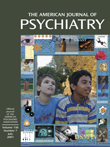DNA Polymorphisms and Bipolar Disorder
To the Editor: I read the article by Francis J. McMahon, M.D., and colleagues (1) with special interest. Although their discussion on the lack of association of bipolar disorder and mitochondrial DNA haplogroups is reasonable, basing that conclusion on four mitochondrial DNA polymorphisms whose odds ratios were greater than 2 or less than 0.5 is not persuasive. While the findings on 1888 and 10463 polymorphisms reflected only slightly higher rates of T haplogroups in subjects with bipolar disorder, the findings on 709 and 10398 polymorphisms were not related to haplogroup. In other words, these two polymorphisms were associated with bipolar disorder in comparison with haplogroup-matched comparison subjects. The authors concluded that these two polymorphisms were not associated with bipolar disorder because the direction of any nominal differences between patients and comparison subjects varied across haplogroups. However, the number of subjects in each haplogroup was too small to draw such a conclusion.
My colleagues and I recently reported that two mitochondrial DNA polymorphisms, 5178 A/C (2) and 10398 G/A (3), were associated with bipolar disorder. The 5178 site is not polymorphic in Caucasians because most of them have the 5178C genotype. In these positions, the 5178C and 10398A genotypes were more frequently seen in patients with bipolar disorder than in comparison subjects in our study group. In Japanese people, the 10398A genotype was found in 33% (44 of 133) of the subjects with bipolar disorder and in 22% (38 of 171) of the comparison subjects (odds ratio=1.7, p<0.05). The finding by Dr. McMahon and colleagues that the odds ratio of the 10398A genotype was higher than 2 (78% in bipolar subjects and 64% in comparison subjects) coincides with our results. Since these two independent studies among different ethnic groups showed similar tendencies, the 10398 polymorphism in mitochondrial DNA may be one risk factor for bipolar disorder, although its effect is small.
1. McMahon FJ, Chen YS, Patel S, Kokoszka J, Brown MD, Torroni A, DePaulo JR, Wallace DC: Mitochondrial DNA sequence diversity in bipolar affective disorder. Am J Psychiatry 2000; 157:1058-1064Google Scholar
2. Kato T, Kunugi H, Nanko S, Kato N: Association of bipolar disorder with the 5178 polymorphism in mitochondrial DNA. Am J Med Genet 2000; 96:182-186Crossref, Medline, Google Scholar
3. Kato T, Kunugi H, Nanko S, Kato N: Mitochondrial DNA polymorphisms in bipolar disorder. J Affect Disord 2001; 62:151-164Crossref, Medline, Google Scholar



